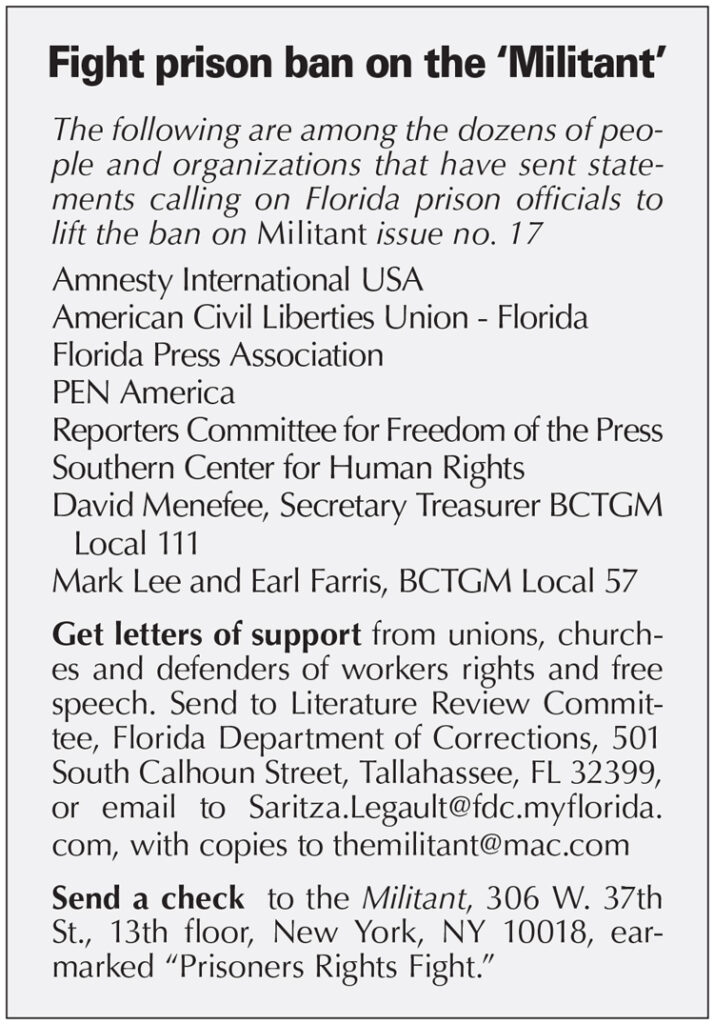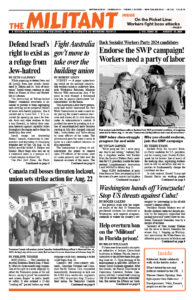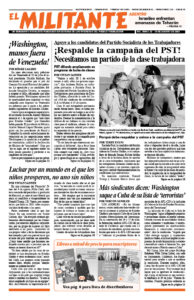It’s been over three months since prison authorities at Jackson Correctional Institution in Malone, Florida, barred a subscriber to the Militant there from getting issue no. 17. Upon learning of the impoundment in mid-May, Militant attorney David Goldstein appealed. After two months, the Florida Department of Corrections Literature Review Committee told him it would hold a hearing July 18 to review the prison authorities’ ban. But neither the Militant nor Goldstein has heard anything since.
Numerous organizations and individuals have sent letters to the committee urging it to overturn the ban.
One of those groups is PEN America. It is also appealing a Literature Review Committee decision that prohibits its publication, The Sentences that Create Us: Crafting a Writer’s Life in Prison, from state prisons and jails in Florida.
The Militant issue impounded by prison authorities featured an article that reprinted the opening chapter of a new Pathfinder book, The Fight Against Jew-Hatred and Pogroms in the Imperialist Epoch: Stakes for the International Working Class.
Among photos in the book is a widely circulated Associated Press picture showing the body of a Jewish man murdered by Hamas during its Oct. 7 pogrom in Israel being driven around Gaza City to cheers by the Islamist thugs’ supporters.
Jackson Correctional Institution officials wrote, “Picture shows dead person being paraded around on a motorcycle; Magazine depict hatred toward a specific race.”
Prison authorities claim the photo is “dangerously inflammatory,” encouraging “riot, insurrection, rebellion” and “organized prison protest.”
Ban has lasted over three months
The amount of time that this impoundment has lasted is a clear violation of prisoners’ political rights and the right of the Militant to reach its subscribers behind bars. Since the ban the Militant has printed 15 additional issues, reaching hundreds of incarcerated workers, including the subscriber at Jackson. And the number of inmates getting the paper across the country is growing.
“Many letters from prominent individuals and organizations have already been sent to the Committee,” Martha Dowling, a retired member of the United Steelworkers union, wrote to the Literature Review Committee Aug. 11, “yet the ban on Militant issue no. 17 continues. You are well aware that this is unconstitutional and a violation of prisoners’ right to read literature of their choice.
“If, indeed, you have read the article cited as the reason for the ban,” writes Dowling, “you are further well aware that this photo and article in no way ‘depict hatred toward a specific race.’ Your ban is an arbitrary and punitive act to prevent prisoners’ access to information and to block the distribution of the Militant. I join the call to request that you reverse the ban.”
“Stop impounding my Militant!” wrote a prisoner in Florida in a hand-written letter sent to the committee, a copy of which was sent to the paper. “Your government is a system of oppression and exploitation and everything, including ‘justice,’ is nothing but a commodity.”
On the form sent to the paper renewing his subscription, another prisoner from Florida wrote, “Continue to fight the FDOC ban on the Militant.”
Keep the letters coming!


